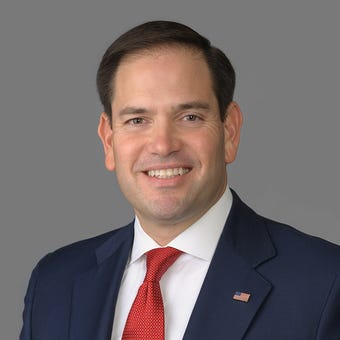Marco Rubio: Big Tech has the power to wipe anyone out
Florida Republican sounds the alarm saying Big Tech has assumed government like powers without being held accountable on 'Hannity'
A little over a year ago, Big Tech shut down conversation about the origin of the coronavirus pandemic. Twitter suspended a Chinese virologist who suggested the virus was man-made. Until just last month, Facebook prohibited users from posting anything that suggested the virus came from the Wuhan Virology Institute, rather than from nature.
Now, it appears Big Tech "fact checkers" agree that the lab-leak theory is a credible explanation for the virus.
Today, America stands at a dangerous impasse. Big Tech has usurped what are essentially authoritarian powers -- the power to decide what you’re allowed to see, what you’re allowed to post, and with whom you’re allowed to share.
Apple, Microsoft, Google, Facebook and Twitter all have the power to wipe you off the face of the Earth. They have repeatedly demonstrated their willingness to ban and censor users espousing beliefs they consider conservative, or ones that otherwise dissent from the far-left echo chambers now ubiquitous online.
TWITTER REVERSES SUSPENSION OF BARSTOOL SPORTS' DAVE PORTNOY AMID BACKLASH
Aside from censoring Americans, Big Tech also regularly engages in content manipulation. Just weeks before the 2020 election, a New York Post story published content found on Hunter Biden’s hard drive that implicated Joe Biden in his son’s foreign deals.
Twitter immediately suppressed the story by suspending the New York Post’s account and preventing users from sharing the link to the story. White House Press Secretary Kayleigh McEnany was even temporarily kicked off Twitter for sharing the article. Facebook limited the spread of the story, citing "misinformation." Fast-forward to today, and the Post’s reporting on Hunter Biden has held up, but Big Tech managed to run interference until after Election Day.
Big Tech has destroyed countless reputations, openly interfered in our elections in favor of Democrat candidates, and baselessly censored important topics in our national discourse. How do they get away with it?
BIG TECH FACES NEW ONSLAUGHT ON CAPITOL HILL AS LAWMAKERS PUSH PACKAGE OF ANTITRUST BILLS
The answer is Section 230. When lawmakers first wrote Section 230 of the Communications and Decency Act in 1996—the same year the Palm Pilot was introduced to the world and a year before Google was even founded—Congress wanted internet companies to be able to host third-party content and engage in targeted moderation of the worst content without being responsible for what was written by others. These internet companies were not writing their own posts and content unlike traditional publishers such as the New York Times or Wall Street Journal, which generally can be held accountable for false information.
But since the bill’s passage 25 years ago, the once scrappy internet companies that benefited from Section 230’s protections have transformed into monopolistic titans. Their mission changed, too. Today’s tech giants use opaque algorithms, unaccountable moderating teams, and so called "fact checkers" to manipulate America’s discourse to their worldview.
CLICK HERE TO GET THE OPINION NEWSLETTER
Section 230 gives these companies immunity from nearly all liability—a privilege no other industry enjoys.
The result is a profoundly diseased public square. That’s why, this week, I introduced my DISCOURSE Act, which would modernize and limit the immunity granted to tech firms by Section 230 and inject long overdue accountability into the industry. To start, my bill would strip liability protection for firms that fail to comply with existing obligations, such as informing users of screening options and parental screens.
Under Section 230 as it is written today, Big Tech firms are able to get away with censoring Americans on the exceedingly vague basis of content being "otherwise objectionable." My bill would dump that unacceptably vague language and replace it with concrete categories, like "promoting terrorism."
More from Opinion
- Dan Gainor: NY Times PR account with few followers on Twitter is paper's odd line of defense against critics
- Tucker Carlson: The COVID vaccine is dangerous for kids, Big Tech doesn't want you to know that
- Rep. Jim Banks: Biden finally acknowledges violent crime spike but won't dare admit Democrats' responsibility
My legislation also includes a religious liberty clause, stating explicitly that Section 230 doesn’t extend liability protection to decisions that restrict content for its religious nature. It would also force transparency into Big Tech by requiring firms to issue public disclosures related to content moderation, promotion, and curation.
Most importantly, my bill would broaden the scope of practices that make a company liable for content on their platform. Specifically, the DISCOURSE Act would remove protections for firms that engage in the following three destructive behaviors: first, manipulating algorithms to target users who have not requested or searched for the content; second, moderating users to promote or censor a specific viewpoint; and third, it would make providers responsible when they engage in information creation and development.
If a company establishes a pattern of these behaviors, my legislation would make it liable for all of the content on its site.
Today, a group of unelected, anonymous, and unaccountable people now have the power to determine what can and can’t be said in day-to-day online conversation. Every single day we allow this status quo to remain in place, our new public square becomes more censorious and disconnected from reality.
CLICK HERE TO GET THE FOX NEWS APP
Now, Congress must pass the DISCOURSE Act, so we can hold Big Tech accountable and make sure our laws reflect the realities of the present.
Our democracy depends on it.



